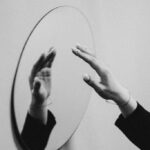Cover photo by Kendra Petersen Kamp photokendra.com
The major movements in rock music since the 1960s can mostly be characterized as reactionary. It’s easy to paint punk’s origins in the 1970s as a response to the increasingly bloated personas and garish aesthetics rock music was incubating at the time, with alternative rock steadily rising for similar reasons against the hair-metal of the 1980s. This momentum built to the explosion of grunge and subsequent major-label buy-in that transitioned “alternative” from a helpful and accurate ethical descriptor to a context-stripped aesthetic, which would then be met with the indie-rock movement of the aughts. From spandex, to leather, back to spandex, to denim, to flannel, back to leather again and finally to Oxford sweaters, rock has kept itself preoccupied by undoing the sins of its old guard. That is, until now.
A lot of good writing was done in the 2010s documenting the newest wave of rock music, which largely came from female artists, artists of color, and LGBTQ+ artists. Beginning around 2016, year-end lists began reflecting this new moment with Mitski, Vagabon, Jay Som, Perfume Genius, Courtney Barnett, Moses Sumney and Japanese Breakfast receiving frequent recognition. But one key factor that separates this moment in rock music is that it’s difficult to call it a Movement in the traditional sense; these bands and artists aren’t taking up arms against the music around them or turning the genre on its head or whatever else Movements are supposed to do. They’re just people who like rock music and are making it the way they want to.
At the same time as the rise of a new wave, the late 2000s pantheon of genre-experimental indie rock artists returned when Dirty Projectors, Grizzly Bear, Fleet Foxes, Arcade Fire, Vampire Weekend, Bon Iver, Spoon and more put out albums after some period of inactivity. Several of these bands spent quite a bit of breath supporting their new and successful albums and complaining about how nobody cares about new and successful albums anymore. On one occasion, Dave Longstreth of Dirty Projectors and Robin Pecknold of Fleet Foxes went as far as suggesting the rock music of today lacks vitality.
It was as if a vocal contingent of these groups were begging to be the villains; old news with opinions worth lashing out at. But the response from newer artists was pretty muted, with little more than a few tweets aimed at affirming one another’s work. The non-confrontation worked in keeping things fluid—three years after Longstreth and Pecknold’s comments, there isn’t really a bold line between 2000s and 2010s indie rock in terms cultural cache. It’s easy to be a fan of both.
The reasons for rock’s indifference towards indie’s old hegemony are several. For one, there isn’t the massive major-label structure that could create the giant rock-monsters of decades past. Sure, Arcade Fire are on a major now and are pretty overblown at this point in their career, but they don’t really have the ubiquity to make a great “rock villain.”
And nobody tried to make them—or anyone—out to be one. The collective indifference towards an often out-of-touch population of older artists ties into a second, more distinctive reason for rock’s non-reactionary posture; this is the first group of rock artists who grew up almost entirely with the internet.
The internet has changed the way we think. Information is more accessible than it has ever been; data, analysis, commentary, point, counter-point—all this is available with the click of a button. And through live feed and streaming platforms, we can now easier directly witness all of the horrors and wonders this world has to offer. We have seen initiatives such as Black Lives Matter and #MeToo spark and spread with unprecedented speed and visibility, but they have also had staying power as they still shape public discourse and thinking. This ease of spread and access can certainly be manipulated, as we’ve seen plenty of, but at its best it has made us more broadly focused.
Today’s rock music is reflecting this broadened focus. While bands like Vampire Weekend and Dirty Projectors embodied the mechanics of the Internet in the 2000s—the easy access to new sounds and aesthetics offered by digitization of music—the new wave of rock music embodies the attitude of the internet: one where there is an astute understanding of the all-pervasive nature of systemic issues such as racism, sexism, homophobia, transphobia, and classism. Said another way, the rock bands of today aren’t unified in reacting against any one group or aesthetic because they understand that the world wouldn’t be fixed if yesterday’s tired band were gone. Instead, they are telling their own stories and attacking injustice and prejudice wherever it arises, even within their own ranks.
This is a good thing. It provides artists more space to be themselves—to make the art they want to make and not uphold any sort of cultural hegemony. Instead, rock music can go forward, striving to serve as a corrective force and haven for a broader group of people in the hands of a determined and excellent wave of artists.

Jordan Petersen Kamp graduated in 2017. He works as the controller for Trellis, a certified Herman Miller furniture dealer located in West Michigan. In his spare time he enjoys talking about the books and albums he looks forward to reading and listening to someday—the ones that he’s definitely heard of but not heard or read yet.









I loved reading this. It’s tough to keep up with the swaths of good rock music made these days, and I think you pinpoint here why we’re now opened up to so many good tunes. I will say that in the last few years Greta Van Fleet came close to being villainized, and while that was fun for a moment, you quickly come to realize that it’s much more fulfilling to come alongside new artists than to drag them.
Oh yeah, that’s a great point about Greta Van Fleet. Jack White feels maybe close to being a rock villain in some ways too?? That’s interesting. I think artists like that are more villainous for being overly nostalgic and perhaps exhibiting a narrow or hyper-specific type of masculinity, which feels a little different from something that was cool becoming uncool based on a new generation of artists responding to it. Like, I think the bookish 2000s indie rock would have also felt in opposition to a Greta Van Fleet (maybe a band like The Darkness works as a proxy?)
You’re right about artists being villainized for being overly nostalgic! Overly nostalgic or seemingly regurgitating older tropes without bringing anything genuine into the mix. The Darkness were never made to be villains because they were clearly interested in having fun and being campy while still writing bangers. The mid 2000s indie scene just laughed along with them. I mean, Permission to Land has an 8.4 review on Pitchfork!
You got it. Art really only needs to be true to itself.